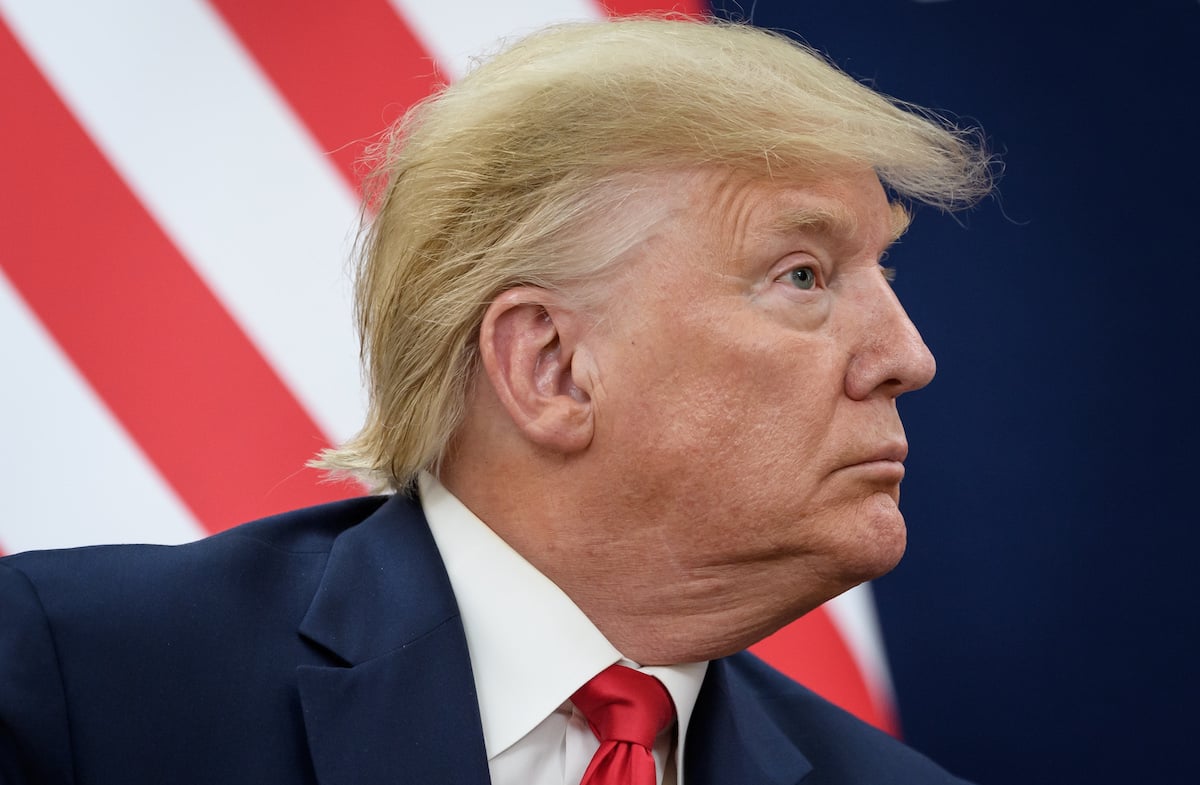As the second day of impeachment begins, after thirteen hours of debate Tuesday, you might still be unclear on what Trump’s actual defense is. His representatives have complained about the process, and they’ve accused Democrats of just not liking him, neither of which are substantial arguments.
Trump’s legal team has also released a 110-page defense of their client that outlines the case they’ve already started making on the Senate floor. Their argument is based on four pillars, all of which are total nonsense.
First of all, the entire document (which you can read here) is dramatic as all hell and chockablock with hypocrisy. Take, for example, this proclamation:
Anyone having the most basic respect for the sovereign will of the American people would shudder at the enormity of casting a vote to impeach a duly elected President.
Funny, I don’t remember a whole lot of Republicans “shuddering” back in 1999 around Bill Clinton’s impeachment inquiry.
But as for the actual fourfold argument, here’s what they’ve got:
“I. The Articles Fail Because They Do Not Identify Any Impeachable Offense.”
This one is strange because a lot of this defense is not denying that Trump did the things he’s been accused of, arguing instead that those things just aren’t technically impeachable.
To start, the document argues, “House Democrats’ Theory of ‘Abuse of Power’ Is Not an Impeachable Offense.” The memo also says “obstruction of Congress” isn’t an impeachable offense. Those statements would, again, probably come as a surprise to those 1999 Republicans, who attempted to impeach Clinton of both of those charges. In Clinton’s case, abuse of power was voted down in the House but obstruction of justice made its way to the Senate.
That’s not the only precedent, either. Richard Nixon was also charged with both abuse of power and obstruction of justice (though he resigned before the articles made it to the Senate) and while they may not have used that term, abuse of office was the foundation for the impeachment of Andrew Johnson.
I don’t know how Trump’s counsel thinks this argument would work, because it doesn’t. At all. Later on, the document argues that Trump wasn’t obstructing Congress, he was just “defending the separation of powers.” Except that’s not what happened. First of all, in 1974, around Nixon’s impeachment, the Supreme Court ruled that the president could not use “executive privilege” as an excuse to withhold information from the other branches of government.
So that thing Trump has admitted to doing–and keeps admitting to doing–has already been declared by the Supreme Court to be obstruction.
The second article of impeachment was for obstruction of Congress: covering up witnesses and documents from the American people.
This morning the President not only confessed to it, he bragged about it:
“Honestly, we have all the material. They don’t have the material.” pic.twitter.com/DPAEFHIDjS
— Rep. Val Demings (@RepValDemings) January 22, 2020
House Democrats were engaging in a legitimate, Constitutionally-sanctioned process and Trump was doing everything he could to stop it. Which brings us to the memo’s next argument:
“II. The Impeachment Inquiry in the House Was Irredeemably Flawed.”
Yeah, I wonder why that was??? The memo rails against the partisanship of the impeachment inquiry as if Senate Republicans aren’t currently trying to one-up the House Democrats in the game of using a majority to set your own terms. The document criticizes House Democrats for refusing to let Trump participate (which they didn’t–it was Trump who refused to cooperate) and for bringing in “hand-picked witnesses” as if it weren’t the Trump administration that was blocking most witnesses from appearing.
This section is just nothing but hypocrisy and lies. Basically, Trump wanted the impeachment inquiry to proceed like a criminal trial, despite those being two very different things. Let’s move on.
“III. Article I Fails Because House Democrats Have No Evidence to Support Their Claims.”
Trump’s counsel is arguing that he can’t be charged with abuse of power because there’s no evidence that he abused his power. Which, for one, isn’t true. They say there haven’t been any witnesses with firsthand knowledge of a crime. That’s false. Also, there were and still are potentially even more firsthand witnesses (like John Bolton) who have been blocked from giving their testimony by Trump and Senate Republicans.
Finally, the memo argues,
IV. The Articles Are Structurally Deficient and Can Only Result in Acquittal.
Basically, they’re arguing that the charges are so big and broad that it’s unreasonable to expect anyone to know how to vote on them. Which I guess Trump should have thought of before he went and committed such big, broad crimes.
(via CNN, image: FABRICE COFFRINI/AFP via Getty Images)
Want more stories like this? Become a subscriber and support the site!
—The Mary Sue has a strict comment policy that forbids, but is not limited to, personal insults toward anyone, hate speech, and trolling.—










Published: Jan 22, 2020 12:46 pm